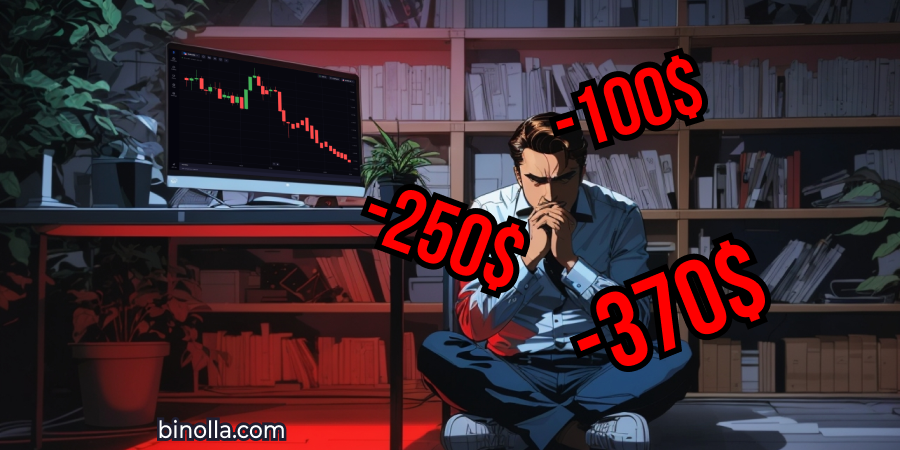Emotions in Trading: What Prevents You From Being a Successful Trader

Having a good strategy is only half the way to success in trading. Even if you spend days and weeks trading on the demo account, you can hone your hard skills, but still, you will not be able to master soft skills, which are known in trading as psychology. While most traders often postpone the study of this section to the end of their training journey, not knowing the emotions that interfere with your trading routine and ignoring them may cost them an arm and a leg.
While trading on the demo account will allow you to test your strategy, you can’t feel what every trader who trades for real money feels. The main difference between using a training account (paper trading) and a real-money one is that none of the emotions will bother you in the first case, while all of them will actively impede you in your attempt to profit in the financial markets. By reading this article, you will learn more about your main psychological enemies and how to tackle them when you are trading for real money. if you are already to start trading, open an account with Binolla.
Contents
- 1 4 Worst Traders’ Enemies
- 2 Apply this knowledge with Binolla!
- 3 Can a Trader Exclude Emotions from Trading?
- 4 FAQ
- 4.1 Why is it important for traders to manage their emotions while trading?
- 4.2 How can emotions such as fear and greed impact trading decisions?
- 4.3 What strategies can traders use to control their emotions while trading?
- 4.4 How can traders leverage emotions like hope and regret to improve their trading outcomes?
4 Worst Traders’ Enemies
Trading decisions are not driven by technical or fundamental analysis. Whatever pattern you see or whatever fundamentals you use to place a trade, there is an intermediate between what you see and what you do. First, we are going to look at the most powerful emotions that, if left uncontrolled, may bring you significant losses.
Fear
This is one of the key emotions that affect your trading. Normally, it is caused by impending danger. When it comes to trading, fear is revealed after a loss or a series of losses. Fear is what causes significant market falls in times of financial and economic turbulence. Moreover, fear makes markets decline much faster than they rise!
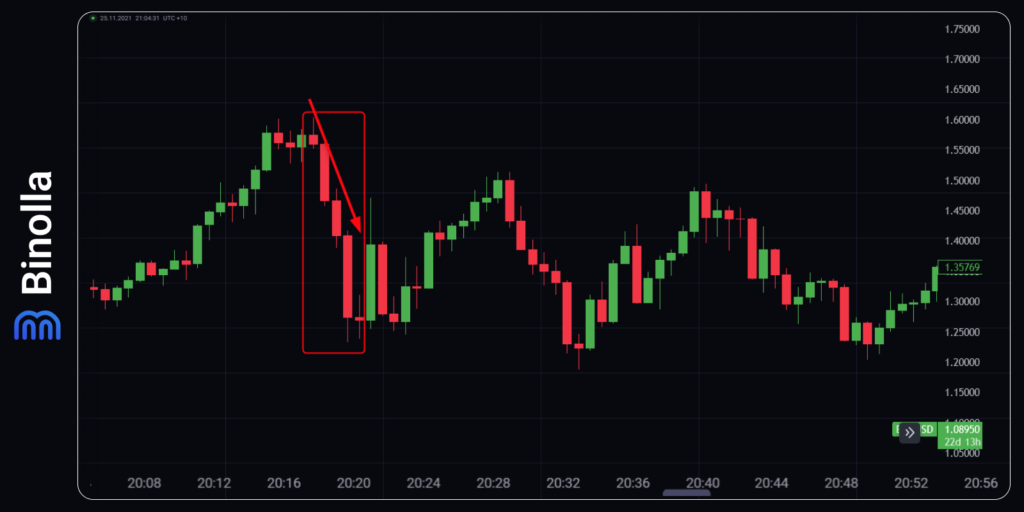
The chart above shows an abrupt price fall during the financial crisis that took place in 2008. The part of the chart to the left of the red vertical rectangle was an uptrend, which was steady. However, once the news about the financial crisis spread, the price dropped sharply and covered most of the previous uptrend.
What happened in this case? Rumors of the financial crisis led to panic, which drove to sell-offs of many assets, including currencies.
The same is relevant for every single trader. Fear leads to panic sales, which prevents traders from achieving their goals in trading. Even if they have placed stop losses and take profits, they may close positions beforehand if they are afraid of something.
In digital options, by the way, this problem does not exist as the results are binary and you don’t need to protect your risks or set trading goals.
However, fear may lead to other negative consequences. For instance, after having a heavy loss or a series of losses, a trader may skip good trading opportunities just because of fear. It can be a great and clean setup, but a trader may simply miss it because of this subconscious feeling of danger.
For FX traders, fear may be not only an enemy but also a friend. If you fear big losses, you will place tighter stop losses. Moreover, if you are in a bad trade, you may exit the market without any regret.
Greed
Another natural human emotion that may ruin your trading results is greed. While greed may be helpful if you control it within healthy rates, it may be dangerous if left without control. How is this emotion revealed in trading?
When it comes to Forex or stock trading, traders may think of bigger profits after they have made large amounts already. Therefore, they can move their take profit orders or simply hold their positions for longer expecting more money to come.
Another example of how uncontrolled greed may badly influence trading results is when traders break their own money and risk management rules. Whether you are trading digital options, Forex currencies, or stocks, you may think about increasing your investment amount at some point and exceeding the golden 1-5% money management rule. The problem here is that if you are lucky to make money, you can increase your balance by a higher amount. However, if not, you will lose more than you can afford per trade.
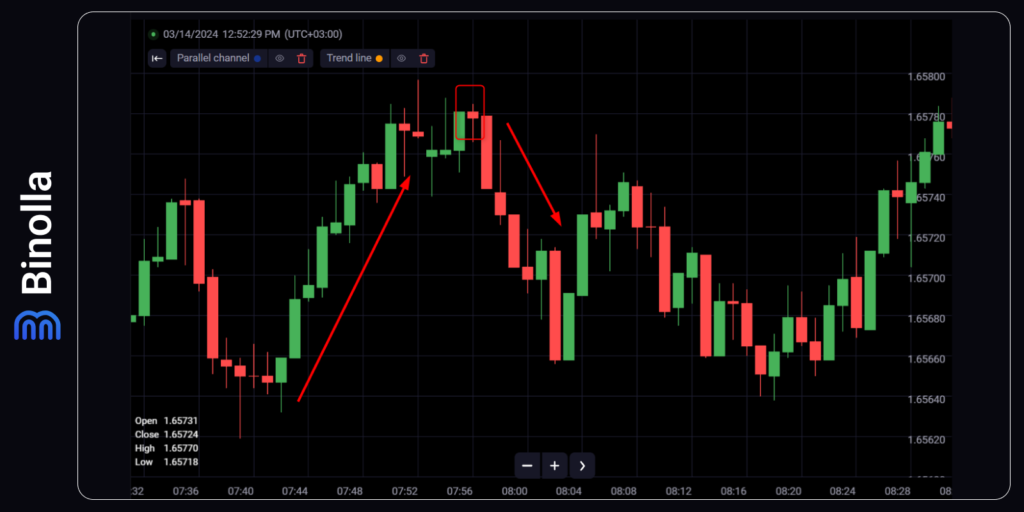
Being greedy for FX and stock traders may be harmful. While digital options traders are protected from “Greed” by the fixed-time nature of the contract, those who trade on Forex or stock exchanges may lose part of their profits or even turn profits into losses. The example above shows that there is a reversal formation after the uptrend. Therefore, traders should pay attention to signals instead of simply waiting for more profits to come.
Hope
This emotion is a feeling of a desire for some events to happen. While hope seems to be a good feeling, in trading it may be one of your worst enemies. Again, when it comes to digital options, you are mostly protected from this emotion as you don’t need to place stop losses and take profits, i.e. decide where to close your trades.
As for Forex and stocks, hope may prevent you from closing bad positions as your inner voice will tell you to hold them for a while. Even if you use stop losses, for instance, there is no guarantee that you will leave them intact. A lot of beginner traders move stop losses in the hope of better results and that the price will reverse in their direction in a couple of pips.
Even if you are trading digital options, hope may become your worst enemy if you rely on it more than on your strategy. Traders can “hope” that the price will make a reversal in a particular situation instead of relying on technical analysis tools or fundamentals.
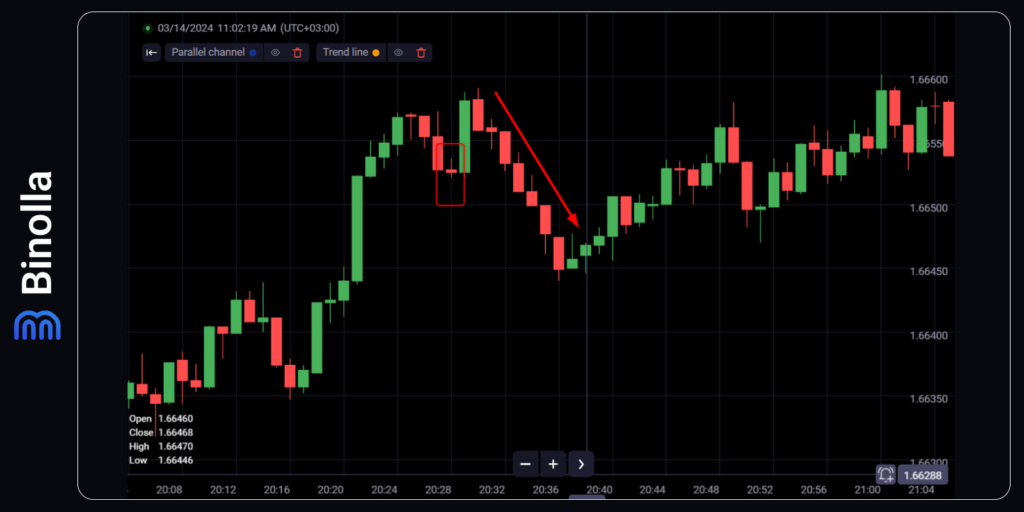
Hope is not the best advisor in trading. In the example above you can see that the price moved upper after the inverted hammer pattern. If you bought a Higher contract, you could profit from this situation. However, for FX or stock traders, buying and holding could lead to losses if they failed to close the trade before the price went below the opening one.
Regret
Regret is another emotion that may have a negative impact on your trading results. In general, this is a feeling of sadness or disappointment. When it comes to trading, regret may come after losses or missed opportunities.
Regardless of the market or financial instrument that you use, you can’t be protected from feeling regret, but as with other emotions, you can learn how to minimize its impact on your trading.
Keep in mind that trading is impossible without losses, especially for newcomers who still have no strategy. Therefore, it is natural for traders to feel this emotion. Another situation when you can feel regret is when you miss a trading opportunity. Traders should not focus on that as the next opportunity will come sooner or later.
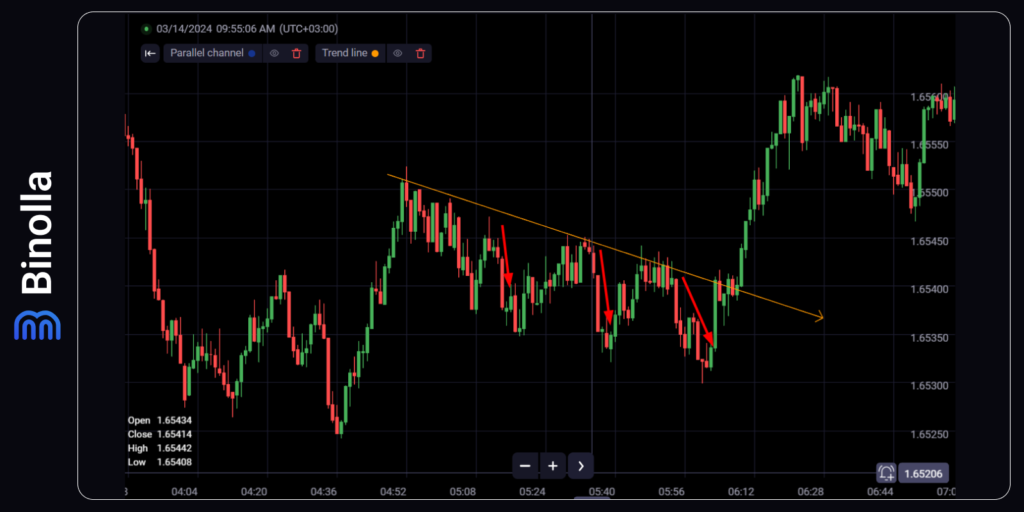
In the example above you can see that regretting missed opportunities is not the best option. While one trader focuses on this, another will draw a descending trendline and find several entry points with clear trading signals to buy Lower contracts or to sell a currency pair/stock.
Can a Trader Exclude Emotions from Trading?
The answer is “No”. Excluding emotions is impossible as traders are human beings and they will feel like other human beings. Instead of trying to do the impossible, you can manage your emotions, and here are some tips on how to do it:
- Don’t trade when you are angry. Regardless of the reason why you are angry, don’t undertake any trading activities in this condition. Especially after taking losses. There is nothing worse than trading to recoup what you have lost in your previous trades. This can lead to even more losses instead of bringing your lost money back;
- Avoid becoming emotionally attached to your trades. Traders often fall into the trap of stubbornly holding onto positions, hoping for a turnaround. Instead, cut your losses early, close out unfavorable trades, and move forward. Your trading journal holds valuable insights for your next steps;
- Take breaks between trades to clear your mind. The fast-paced nature of trading can be overwhelming, so take a moment to step back and focus on something else. Return with a refreshed perspective and consult your trading journal for guidance on your next move;
- Establish predetermined stopping points to prevent overtrading. After a set number of trades, take a substantial break. Many trading mistakes occur when one trade follows another too quickly. Utilize your trading journal to assess your strategy and make necessary adjustments;
- Avoid fixating on profit and loss calculations, as they can trigger emotional responses. Concentrate on refining your trading strategy instead. Review your trading journal at the end of the day to evaluate your performance objectively;
- Stay committed to your trading plan despite short-term fluctuations. Resist the temptation to deviate from your strategy based on isolated trade outcomes. Use your trading journal to refine your approach and stay focused on your long-term goals;
- Distinguish between prudent decision-making and fear. While it’s essential to trade cautiously, ensure that your actions are driven by logic, not fear. Consult your trading journal to validate trade decisions based on past successes rather than succumbing to fear;
- Beware of greed, which may tempt you to hold onto trades for excessive profits. Stick to your exit strategy and avoid getting greedy, as it can lead to unfavorable outcomes. Use your trading journal to identify optimal exit points based on historical data;
- Exercise caution when managing stop-loss orders and profit targets. Thoughtful placement of stops and limits can prevent impulsive decisions. While being stopped out can be frustrating, it ultimately safeguards against significant losses. Refer to your trading journal for insights on effective stop levels;
- Persist in your trading endeavors, even when faced with challenges. Every trader experiences moments of doubt, but perseverance is key to long-term success. Remember, trading may be tough, but with determination, you can achieve your goals.
- Risk Management. Use risk management techniques such as setting stop-loss orders, position sizing, and diversification to mitigate potential losses. Fear of losing money can be a powerful motivator to stick to your risk management plan and avoid taking excessive risks;
- Setting Realistic Expectations. Avoid succumbing to greed by setting realistic profit targets and not chasing unrealistic returns. Understanding that trading involves both wins and losses can help temper expectations and prevent overtrading driven by greed.
- Maintain Discipline. Stick to your trading plan and avoid making impulsive decisions based on emotions. Develop discipline through consistent practice and adherence to predetermined rules and strategies;
- Use Fear as a Signal. Fear can serve as a valuable signal to reassess your trading decisions and identify potential risks. Instead of letting fear paralyze you, use it as a prompt to review your analysis and adjust your strategy if necessary;
- Balance Optimism with Realism. While hope can provide motivation and optimism, it’s essential to balance it with a realistic assessment of market conditions. Avoid becoming overly optimistic and maintain a critical mindset to make informed trading decisions;
- Learn from Mistakes. Embrace regret as an opportunity for learning and improvement. Analyze your past trades, identify mistakes, and use them as lessons to refine your trading approach and avoid repeating the same errors;
- Practice Self-Awareness. Cultivate self-awareness to recognize when emotions are influencing your trading decisions. Take breaks when feeling overwhelmed or emotional, and focus on regaining a balanced mindset before continuing trading activities.
FAQ

Why is it important for traders to manage their emotions while trading?
Managing emotions is crucial because emotional reactions can lead to impulsive decisions, which may result in losses. By keeping emotions in check, traders can make rational decisions based on their trading plan and analysis.
How can emotions such as fear and greed impact trading decisions?
Fear can cause traders to hesitate or avoid taking necessary risks, potentially causing them to miss out on profitable opportunities. On the other hand, greed may lead traders to take excessive risks or hold onto winning trades for too long, increasing the likelihood of losses.
What strategies can traders use to control their emotions while trading?
Traders can employ various techniques, including mindfulness meditation, setting predefined rules and sticking to them, taking breaks between trades to clear their minds, and focusing on long-term goals rather than short-term fluctuations.
How can traders leverage emotions like hope and regret to improve their trading outcomes?
While hope can provide motivation, traders should balance it with realistic expectations and avoid chasing unrealistic returns. Regret, on the other hand, can serve as a learning opportunity by analyzing past mistakes and making adjustments to improve future trading strategies. By harnessing these emotions effectively, traders can enhance their decision-making process and overall performance.


